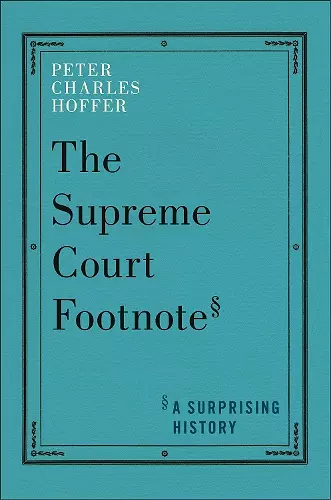The Supreme Court Footnote
A Surprising History
Format:Hardback
Publisher:New York University Press
Published:18th Jun '24
Currently unavailable, currently targeted to be due back around 28th January 2025, but could change

A history of the humble footnote and its impact on the highest court in the land
In May 2022, a seismic legal event occurred as the draft majority opinion in Dobbs v. Jackson Women’s Health was leaked. The majority aimed to eliminate constitutional protection for abortion. Amidst the fervor, an unnoticed detail emerged: over 140 footnotes accompanied the majority opinion and dissent. These unassuming annotations held immense significance, unveiling justices’ beliefs about the Constitution’s essence, highlighting their controversial reasoning, and laying bare the vastly different interpretations of the role of Supreme Court Justice.
The Supreme Court Footnote offers a study of the evolution of footnotes in US Supreme Court opinions and how they add to our constitutional understanding. Through a comprehensive analysis, Peter Charles Hoffer argues that as justices alter the course of history via their decisions, they import their own understandings of it through the footnotes. The book showcases how the role of the footnote within Supreme Court opinions has evolved, beginning with one of the first cases in the history of the court, Chisholm v. Georgia in 1792 (a case concerning federalism vs. states’ rights) and ending with the landmark Dobbs v. Jackson case in 2022. Along the way, Hoffer demonstrates how the footnotes within these decisions reflect the changing role of the Supreme Court Justice, along with how interpretations of the constitution have transformed over time.
At once surprising and revealing, The Supreme Court Footnote proves that what appears below the line is not only a unique window into the history of constitutional law but also a source of insight as to how the court will act going forward.
Hoffer’s prose is elegant and entertaining. This is essential for dedicated court watchers and a fascinating new perspective for casual readers. * Publishers Weekly *
Peter Charles Hoffer’s The Supreme Court Footnote: A Surprising History shows how many clues into the justices’ thinking become available after a ruling—at the bottom of the page. * Inside Higher Ed *
A startling examination of eight influential Supreme Court cases... Hoffer imbues the seemingly arcane topic with drive and urgency. In a time when many see the Supreme Court as politicized and divisive, The Supreme Court Footnote interprets the intricacies of the court’s decisions with intelligence and vision. * Foreword Reviews *
In The Supreme Court Footnote, Hoffer uses several landmark cases to track the rise of judicial footnotes and to explore legal reasoning along the way... [he argues] with nuance and academic rigor. * Wall Street Journal *
A delightful and erudite romp in the underbrush of the Supreme Court through American history, one that tracks the Court’s path through time and illuminates its major landmark decisions – while hinting at suppressed, below-the-line alternative stories that might have been. A really fun read. -- John Fabian Witt, author of Lincoln’s Code: The Laws of War in American History
The Supreme Court Footnote provides a valuable guide to important issues of constitutional law and jurisprudence. This engaging account of how Supreme Court justices have used footnotes offers readers significant insights into Supreme Court history and opinion writing practices. Hoffer’s eight case studies show how footnotes can illuminate the justices’ thinking and guide the development of the law. -- Mark Tushnet, William Nelson Cromwell Professor of Law emeritus, Harvard Law School
A scholarly romp casting light on the most famous footnotes in Supreme Court history as well as more obscure footnotes that ought to be better known. Peter Charles Hoffer provides an accessible account of why reading all the words of Supreme Court opinions matter and why they matter. -- Mark Graber, Regents Professor, University of Maryland Francis Carey School of Law
ISBN: 9781479830220
Dimensions: unknown
Weight: 531g
232 pages